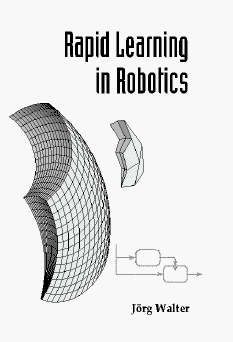Rapid Learning in Robotics
by Jörg Walter
Cuvillier Verlag, ISBN 3-89588-728-5, 1996
167 pages
This book is also available as

Rapid Learning in Roboticsby Jörg WalterCuvillier Verlag, ISBN 3-89588-728-5, 1996 167 pages This book is also available as
|  |
Robotics deals with the control of actuators using various types of sensors and control schemes. The availability of precise sensorimotor mappings - able to transform between various involved motor, joint, sensor, and physical spaces - is a crucial issue. These mappings are often highly non-linear and sometimes hard to derive analytically. Consequently, there is a strong need for rapid learning algorithms which take into account that the acquisition of training data is often a costly operation.The present book discusses many of the issues that are important to make learning approaches in robotics more feasible. Basis for the major part of the discussion is a new learning algorithm, the Parameterized Self-Organizing Maps (PSOM), that is derived from a model of neural self-organization. A key feature of the new method is the rapid construction of even highly non-linear variable relations from rather modestly-sized training data sets by exploiting topology information that is not utilized in more traditional approaches. In addition, the author shows how this approach can be used in a modular fashion, leading to a learning architecture for the acquisition of basic skills during an ``investment learning'' phase, and, subsequently, for their rapid combination to adapt to new situational contexts.
``Parameterized Self-Organizing Map'' ( PSOM ), applications to robotics and vision,Copyright:
``Mixture-of-Expertise'' Architecture,